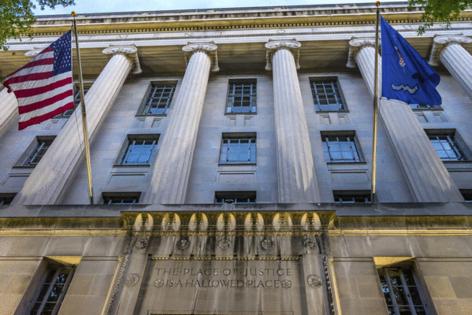DOJ watchdog review sparks change to policy on lawmaker records
Published in Political News
WASHINGTON — The Justice Department has strengthened internal reviews for when it seeks the electronic records of members of Congress and congressional staffers as part of a leak investigation, including notification to the attorney general and other leadership, a watchdog reported Tuesday.
A DOJ Office of the Inspector General review found that two members of Congress and 43 people who were congressional staffers at the time had their records sought, with the goal of identifying the sources of leaked classified information that was included in news articles in 2017.
Both members of Congress were Democrats, 21 of the staffers worked in Democratic positions, 20 worked in Republican positions and two worked in nonpartisan positions, the report found. And non-disclosure orders prevented the members of Congress from learning about the efforts to seek their records.
While the report did not name the lawmakers, the DOJ used subpoenas to obtain information from Apple, including cellphone metadata for at least two House members: then-Rep. Adam B. Schiff and Rep. Eric Swalwell, both California Democrats. Swalwell and Schiff both confirmed their records had been obtained.
The IG report said the DOJ did not at that time have a policy that clearly addressed the use of legal authorities to get records of lawmakers and staffers from third parties or the use of such non-disclosure orders when it came to lawmakers and staffers.
“The Department’s decision to compel the production of non-content communications records of Members of Congress and congressional staffers implicated the constitutional rights and authorities of a co-equal branch of government,” the report states.
“Non-content communications records” include phone and email information, such as the email addresses they were communicating with and the phone numbers they were calling, along with the duration of each call.
In response to the concerns the watchdog highlighted, the DOJ changed several policies. One revised policy makes explicit that the U.S. attorney’s office or other prosecuting component must file an “Urgent Report” to department leadership, including the attorney general and deputy attorney general, before seeking the records.
The Justice Department also added “investigations involving elected or appointed officials” to the list of circumstances that require urgent reporting when there are major developments, the report said. And a prosecutor must disclose in an application filed with the court whether use of a non-disclosure order “would delay notice to a Member of Congress, congressional office, or a congressional staffer,” the report states.
The IG concluded that using the process to obtain those records when based solely on the close proximity in time between access to the classified information and subsequent publication of the information “risks chilling Congress’s ability to conduct oversight of the executive branch.”
That’s because it “exposes congressional officials to having their records reviewed by the DOJ solely for conducting Congress’s constitutionally authorized oversight duties and creating, at a minimum, the appearance of inappropriate interference by the executive branch in legitimate oversight activity by the legislative branch.”
“Moreover, even non-content communications records — such as those predominantly sought here — can reveal the fact of sensitive communications of Members of Congress and staffers, including with executive branch whistleblowers and with interest groups engaging in First Amendment activity,” the IG report states.
The inspector general review did not find any evidence of “retaliatory or political motivation by the career prosecutors” who sought records. But the report said when news broke about the efforts to get records, there were concerns from congressional lawmakers and staffers of both parties “that they may have been politically targeted during the investigation.”
DOJ Inspector General Michael Horowitz announced the review in June 2021, after President Joe Biden had entered the White House. In the weeks before the announcement, The Washington Post and The New York Times reported that the Justice Department had secretly obtained the phone records of their journalists during the Trump administration. The Washington Post reported that the department obtained the records over reporting that the journalists did regarding Russia’s part in the 2016 general election.
In 2021, the House Judiciary Committee under Chairman Jerrold Nadler, D-N.Y., also launched an investigation into the Justice Department’s “surveillance” of members of Congress and journalists, and it pressed Attorney General Merrick B. Garland to provide documents.
“We must determine if the Department sought these sensitive records for improper political purposes,” a group of lawmakers wrote in a letter to Garland.
The report Tuesday said a congressional committee employee had identified two members of Congress as potential leakers but did not provide evidence to support the claim. The department determined the employee to have uncertain credibility and little support for their contention, the report said.
The inspector general report comes as the window is closing to pass a federal press source shield measure in this Congress. The bipartisan bill, known as the PRESS Act and backed by Reps. Kevin Kiley, R-Calif., and Jamie Raskin, D-Md., would prevent the federal government from compelling journalists to reveal their sources except when doing so might prevent imminent violence or identify a terrorist.
Last month, President-elect Donald Trump said on social media: “REPUBLICANS MUST KILL THIS BILL!” in response to a news segment that mentioned the legislation.
Senate Majority Leader Charles E. Schumer’s office said he has plans on Tuesday to ask for unanimous consent to pass the PRESS Act.
©2024 CQ-Roll Call, Inc., All Rights Reserved. Visit cqrollcall.com. Distributed by Tribune Content Agency, LLC.




























































Comments